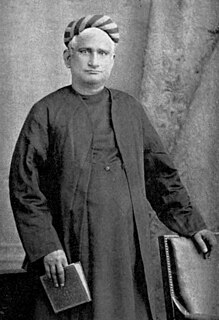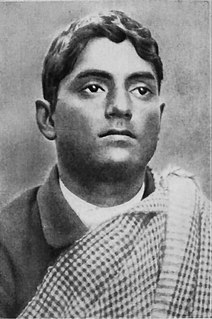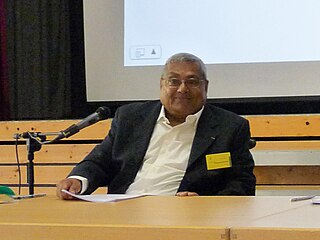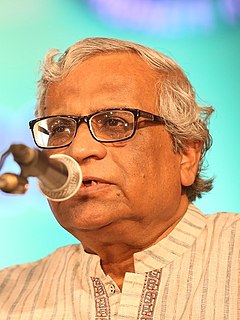Related Research Articles

Hindūstān, along with its shortened form Hind (هند), is the Persian-language name for India that later became commonly used by its inhabitants in Hindi–Urdu. Other toponyms for the subcontinent include Jambudvīpa and Bhārata. Since the partition of British India in 1947, Hindustan continues to be used to the present day as a historic name for the Republic of India.

Bankim Chandra Chatterjee CIE was an Indian novelist, poet and journalist. He was the author of the 1882 Bengali language novel Anandamath, which is one of the landmarks of modern Bengali and Indian literature. He was the composer of Vande Mataram, originally in Sanskrit, personifying India as a mother goddess and inspiring activists during the Indian Independence Movement. Chattopadhayay wrote fourteen novels and many serious, serio-comic, satirical, scientific and critical treatises in Bengali. He is known as Sahitya Samrat in Bengali.

Debiprasad Chattopadhyaya was an Indian Marxist philosopher. He made contributions to the exploration of the materialist current in ancient Indian philosophy. He is known for Lokayata: A Study in Ancient Indian Materialism, which is his exposition of the philosophy of Lokayata. He is also known for work on history of science and scientific method in ancient India, especially his 1977 book Science and Society in Ancient India on the ancient physicians Charaka and Sushruta. He was awarded the Padma Bhushan, India's third highest civilian honour, posthumously, in 1998.

Acharya Sir Prafulla Chandra Ray, CIE, FNI, FRASB, FIAS, FCS was an eminent Indian chemist, educationist, historian, industrialist and philanthropist. He established the first modern Indian research school in chemistry and is regarded as the father of chemical science in India.

The Bengal Renaissance, also known as the Bengali Renaissance, was a cultural, social, intellectual, and artistic movement that took place in the Bengal region of the British Raj, from the late 18th century to the early 20th century. Historians have traced the beginnings of the movement to the victory of the British East India Company at the 1757 Battle of Plassey, as well as the works of reformer Raja Rammohan Roy, considered the "Father of the Bengal Renaissance," born in 1772. Nitish Sengupta stated that the movement "can be said to have … ended with Rabindranath Tagore," Asia's first Nobel laureate.

Bagha Jatin or Baghajatin, born Jatindranath Mukherjee, was an Indian independence activist.

Vidyasagar University was established by an Act of the West Bengal legislature which was notified in the Calcutta Gazette on 24 June 1981. It is an affiliating university in Paschim Medinipur district of southern West Bengal, India. It offers courses at the undergraduate and post-graduate levels.

Prithwindra Mukherjee, retired in 2003 from a career as a researcher in the Human and Social Sciences Department (Ethnomusicology) of the French National Centre of Scientific Research in Paris, is an author of a number of books and other publications on various subjects.
The Star was an English-language evening newspaper in Pakistan that ceased publication in 2005.

Virendranath Chattopadhyaya, alias Chatto,, also known by his pseudonym Chatto, was a prominent Indian revolutionary who worked to overthrow the British Raj in India using armed force. He created alliances with the Germans during World War I, was part of the Berlin Committee organising Indian students in Europe against the British, and explored actions by the Japanese at the time.

Maulvi Abdul Haq was a scholar and a linguist, whom some call Baba-e-Urdu. Abdul Haq was a champion of the Urdu language and the demand for it to be made the national language of Pakistan.
The first Christmas Day plot was a conspiracy made by the Indian revolutionary movement in 1909: during the year-ending holidays, the Governor of Bengal organised at his residence a ball in the presence of the Viceroy, the Commander-in-Chief and all the high-ranking officers and officials of the Capital (Calcutta). The 10th Jat Regiment was in charge of the security. Indoctrinated by Jatindranath Mukherjee, its soldiers decided to blow up the ballroom and take advantage of destroying the colonial Government. In keeping with his predecessor Otto von Klemm, a friend of Lokamanya Tilak, on 6 February 1910, M. Arsenyev, the Russian Consul-General, wrote to St Petersburg that it had been intended to "arouse in the country a general perturbation of minds and, thereby, afford the revolutionaries an opportunity to take the power in their hands." According to R. C. Majumdar, "The police had suspected nothing and it is hard to say what the outcome would have been had the soldiers not been betrayed by one of their comrades who informed the authorities about the impending coup".

Bartaman Bharat is a Bengali language essay written by Indian Hindu monk Swami Vivekananda. The essay was first published in the March 1899 issue of Udbodhan, the only Bengali language magazine of Ramakrishna Math and Ramakrishna Mission. The essay was published as a book in 1905, and later it was compiled into the fourth volume of The Complete Works of Swami Vivekananda.

Anil Kumar Gain FRSS FCPS was an Indian mathematician and statistician best known for his works on the Pearson product-moment correlation coefficient in the field of applied statistics, with his colleague Ronald Fisher. He received his Ph.D. from the University of Cambridge under the supervision of Henry Ellis Daniels, who was the then President of the Royal Statistical Society. He was honoured as a Fellow of the Royal Statistical Society and the Cambridge Philosophical Society.
The National Council of Education - Bengal was an organisation founded by Satish Chandra Mukherjee and other Indian nationalists in Bengal in 1906 to promote science and technology as part of a swadeshi industrialisation movement. It established the Bengal National College and Bengal Technical Institute which would later merge to form Jadavpur University. Institutions which were functioning under the council were considered to be hotbeds of swadeshi activities and the government banned nationalistic activities such as the singing of patriotic songs.

Anupam Sen is a Bangladeshi Author, Sociologist & social activist. He is currently serving as the vice-chancellor of Premier University, Chittagong. He was awarded Ekushey Padak in 2014 by the Government of Bangladesh.
Lalit Mohan Banerjee was an Indian surgeon, medical academic and the first medical professional to receive the degree of Master of Surgery from the University of Calcutta. He was a professor of surgery at R. G. Kar Medical College and Hospital of the Calcutta University and the personal surgeon to the President of India. He was one of the founders of the Association of Surgeons of India and was its third president (1941–1942). It was during this period, he had an opportunity to operate on Rabindranath Tagore, the renowned poet and Nobel Laureate. The Government of India awarded him the third highest civilian honour of the Padma Bhushan, in 1955, for his contributions to medical science. A road in Sodepur has been named after him as Dr. L. M. Banerjee Road'.
Rahul Banerjee is an Indian organic chemist and a professor at the department of chemical sciences of the Indian Institute of Science Education and Research, Kolkata. Banerjee, a fellow of the Royal Society of Chemistry, is known for his studies in the field of Metal–organic framework designing. The Council of Scientific and Industrial Research, the apex agency of the Government of India for scientific research, awarded him the Shanti Swarup Bhatnagar Prize for Science and Technology, one of the highest Indian science awards, for his contributions to chemical sciences in 2018. Currently he is one of the associate editor of international peer-review journal Journal of the American Chemical Society.
Sarala Roy (1861-1946) was an Indian educator, feminist, and social activist. She was one of the first women to matriculate from Calcutta University, and was the first woman to be a member of the University Senate. She founded a school for girls and several women's educational charities, and was a founding member and later, the President of the All India Women's Conference. As President of the All India Women's Conference in 1932, she played a key role in organizing efforts towards women's suffrage, and against child marriage. She was also a strong supporter of educational rights for women and girls.
References
- Chattopadhyaya, Debi Prasad (1999), History of Science, Philosophy and Culture in Indian Civilization: pt. 1. Science, technology, imperialism and war, Centre for Studies in Civilisations., ISBN 9788131728185 .